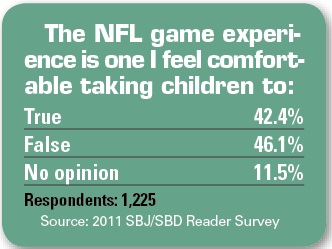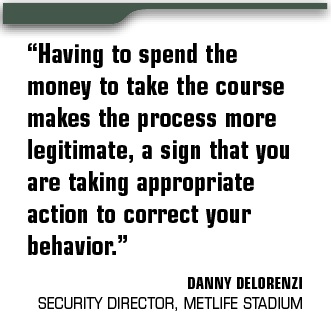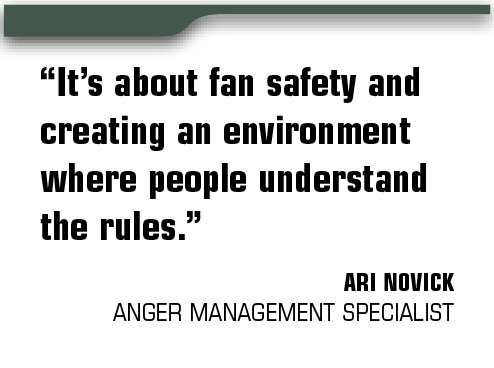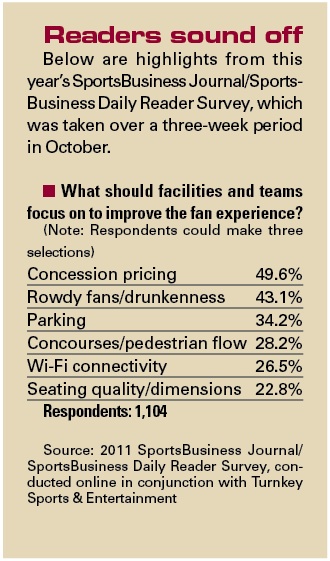MetLife Stadium’s “anti-knucklehead” unit will be roaming the stands at Sunday’s Buffalo Bills-New York Jets game, searching for troublemakers.
Danny DeLorenzi, the stadium’s director of security and safety services, uses the term for his undercover group working the NFL facility. They are on the lookout for fans whose disruptive behavior ruins the game-day experience for those sitting around them.
It could be the guy who drank too many beers and gets into an argument with a fan wearing the visiting team’s colors. It could be somebody else who’s sober but is firing a string of F-bombs in front of a family with children.
Doesn’t matter. The anti-knucklehead unit will find the offenders. Some are identified through the “tattle text” programs, now standard in most sports facilities, that enable fans to report those incidents anonymously through cell phones. Members of the unit fill empty seats around the offender to see and hear what’s going on. After 30 minutes, barring no further incidents, they will inform the fan that they are watching him and to shape up. If the disruptive behavior continues, the fan could be ejected, DeLorenzi said.
The anti-knucklehead unit is only one of MetLife Stadium’s approaches to fan behavior, as pro teams and facilities continue to explore ways to improve how their patrons act, from the moment they enter parking lots to when they leave after the game. In one of the newest tactics, MetLife Stadium has adopted its version of traffic school for game-day offenders.
The program is designed to educate fans ejected from the game for alcohol abuse and offensive language. Early results have inspired several other teams and venues to adopt similar efforts.
At MetLife Stadium, fans kicked out for violating guest-conduct policies must submit a letter of apology and then take an online course before being readmitted for future events. It’s a four-hour course for alcohol-related ejections and a two-hour test for excessive profanity.
If their behavior leads to arrest, the fans must also have their criminal charges resolved in court before they can return to the stadium.
For all stadium ejections, those who get caught back in the building without taking the online courses will be arrested for
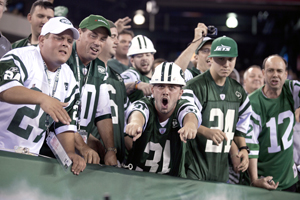 |
New York Jets fans enjoy a game at MetLife Stadium, which uses an “anti-knucklehead” unit to look for any troublemakers.
Photo by: Getty Images |
trespassing, said DeLorenzi, former deputy chief of police in Newark.
The courses were DeLorenzi’s idea. The alcohol awareness class has been in place since the stadium opened in April 2010. This season, the program was expanded with a second course covering the use of excessive profanity. Registration fees are $75 for the alcohol awareness course and $50 for the offensive language course, the one described as the disruptive-behavior class. A small portion of those fees go to Mothers Against Drunk Driving, the Be a Hero campaign and the Boys & Girls Clubs.
For Jets and Giants fans completing the courses, taking the time to understand how their destructive behavior affects other people has been an effective learning tool. To date, there have been no repeat offenders among the 200 people taking those courses.
“It opens your eyes,” DeLorenzi said. “Having to spend the money to take the course makes the process more legitimate, a sign that you are taking appropriate action to correct your behavior.”
“We had one guy messing with people,” he said. “We took him out and later he told us, ‘I finally hit rock bottom. I didn’t realize how much I was offending people.’ Ninety-nine times out of 100, they apologize in the letter for their behavior.”
The course to get back in
MetLife Stadium’s fan behavior courses are now part of the NFL’s list of best practices, said Jeffrey Miller, the league’s chief security officer. The New England Patriots, Indianapolis Colts and Atlanta Falcons have activated courses as well, and the Buffalo Bills, Cleveland Browns, Philadelphia Eagles, Detroit Lions and Green Bay Packers are in various stages of adopting the program at their stadiums.
It all started a few years ago when DeLorenzi was forming ejection procedures for what was then known as New Meadowlands Stadium. He started thinking about what type of “remedial action” would be necessary to be allowed back into the facility.
Searching the Internet, he found Ari Novick, a licensed psychotherapist in California who specializes in anger management. Novick, who has worked with professional athletes over the years, designs alcohol awareness courses online for courts, businesses and school systems.
Together, DeLorenzi and Novick developed a modified course for sports facilities with a series of quizzes and a final exam at the end of the curriculum, and later the disruptive-behavior course for using foul language at MetLife Stadium.
Here is how it works:
When fans are ejected from MetLife Stadium, they are handed a piece of paper explaining the readmission process. They must then submit a letter of apology. At that point, DeLorenzi responds with information on the required course. He goes over the reports of each ejection submitted by his security force to find out whether alcohol was a factor to determine which course must be taken. Most of the time it is, he said. His employees are trained to determine whether someone is alcohol-impaired.
To take the course, fans are directed to Novick’s website, where they make payment before starting the class. Novick
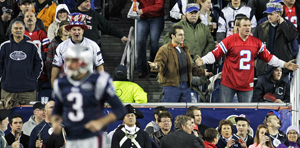 |
To rejoin fans in the stands, the New England Patriots charge $100 to take their course, with half of that fee going to the Be a Hero program.
Photo by: Getty Images |
obtains a portion of the fees directly from his website. Then, depending on the team, Novick forwards donations directly to the club’s charity of choice, or he pays the team and it makes the donation.
To pass, fans must correctly answer 70 percent of the questions for the course, which is written at a seventh-grade level. At that point, they receive certificates of completion that can be sent to DeLorenzi electronically or by regular mail. After DeLorenzi receives the certificate, he sends letters back notifying them of their reinstatement.
“What’s good about doing it online is you can send them back immediately,” DeLorenzi said. “I have received some certificates at 2 or 3 in the morning so they can go to the game [that] day.”
The attorneys who MetLife Stadium officials communicate with over fan arrests tied to ejections have no problems with DeLorenzi’s program and are cooperative with the process. “Not everyone asks to come back,” DeLorenzi said.
The new course tied to excessive profanity is “not a free speech thing, it’s the disruptive behavior associated with that,” he said. “Using the F-word 10 to 15 times becomes disruptive to the whole atmosphere. It’s how they say it, the inflection and the use.”
The courses are customized for each NFL stadium to reflect their differences in guest policies. The text is not written with a punitive slant, Novick said, but to provide a “quality experience” by raising social awareness of issues that have been a long-standing problem in sports.
“It is not a form of treatment or a replacement for outpatient care,” he said. “It is designed to teach people about the risks and consequences of abuse and drinking habits, the legal and physical ramifications, and how it adversely affects their relationships.”
For example, one question explains the rationale behind cutting off beer sales at the start of the third quarter at MetLife Stadium.
“People get upset because they’re having a great time but the reason for that is they need to start to sober up right after halftime,” Novick said. “It’s about fan safety and creating an environment where people understand the rules. Excessive drinking is dangerous.”
Approach catches on
Elsewhere in the NFL, the Colts charge $75 for their Fan Code of Conduct Awareness Course. Twenty-five dollars from that fee goes to the Indianapolis Metropolitan Police Department’s canine unit.
Larry Hall, the Colts’ vice president of ticket sales and guest services, would not identify how many fans have taken the
course, but at Lucas Oil Stadium, which seats 63,000, a very small percentage of fans are ejected during an NFL game, he said.
“Our course is under a broader umbrella,” Hall said. “Maybe there was no alcohol involved in the ejection but the fan was being profane and a nuisance. It’s all about what behavior is acceptable in public, in the stadium.”
The Falcons give fans ejected from the Georgia Dome a mulligan. The team sends the fan a letter stating they have been put on probation. If they are ejected again, they must spend $50 to complete the Novick course before being re-admitted to the stadium for future events.
As of last week, the Falcons had sent about 25 letters to fans ejected from the dome but no one has had to take the course, said Dave Cohen, the team’s vice president of sales. Two letters were connected to alcohol-related incidents,
Cohen said.
The Patriots charge $100 for their course, with $50 forwarded to the Be a Hero program, a nonprofit group and a partner of Techniques for Effective Alcohol Management, a consortium of teams, leagues and concessionaires promoting responsible alcohol consumption.
Of those fans ejected from Gillette Stadium this season, 30 percent to 40 percent have completed the course and mailed a copy of the certificate for re-admission, said Jim Nolan, the Patriots’ senior vice president of operations, administration and finance. Another 30 percent have taken the course but have not submitted the paperwork, partly because of the team’s schedule, which is front-loaded with road games. Officials expect to receive more certificates over the second half of the season, he said.

Violators learn the rules
Those ejected from MetLife Stadium must complete a four-hour alcohol and drug class created by the AJ Novick Group. Here are some of the topics covered:
■ MetLife Stadium “Code of Conduct”
■ Alcohol abuse risk factors
■ Patterns of alcohol abuse
■ The cost of abuse and addiction of alcohol
■ Personal cost of alcohol-related crimes
■ Understanding alcohol and its effect on the body and mind
■ Health risks of alcohol use
■ How alcohol affects the brain, central nervous system and internal organs
■ Risk factors for men and women and underage drinkers
■ Understanding the differences between use, abuse, addiction, relapse and prevention
■ Communication skills as prevention
■ Skills in stress management
■ Stages of change and sustaining change
■ Resources for finding help
Source: AJ Novick Group
In Foxboro, the charitable tie-in is a nice fit, considering the Patriots’ big focus on their designated driver program, Nolan said. The Patriots led the NFL last year with more than 20,000 designated driver signups, four times the league average. So far in 2011, those signups are running 14 percent ahead of last year, and the Patriots expect the total to surpass 24,000 at season’s end, he said.
At Sunday’s Bills-Jets game at MetLife Stadium, the anti-knucklehead unit will be on the lookout for people who could end up being required to take the course. But the unit also will be looking for “The Unforgiven,” the term DeLorenzi uses to identify fans previously ejected from the stadium who sneaked back in without completing the online course.
A group of 12 undercover officials canvasses the stadium, carrying photos of those perpetrators and where they were sitting when ejected. When spotted, they get a summons for trespassing, and are escorted out of the stadium a second time.
“This season we have had one or two come back, and when we see them they get that look on their face,” DeLorenzi said. “It was not necessarily a criminal offense the first time they were ejected, but now it is.”


